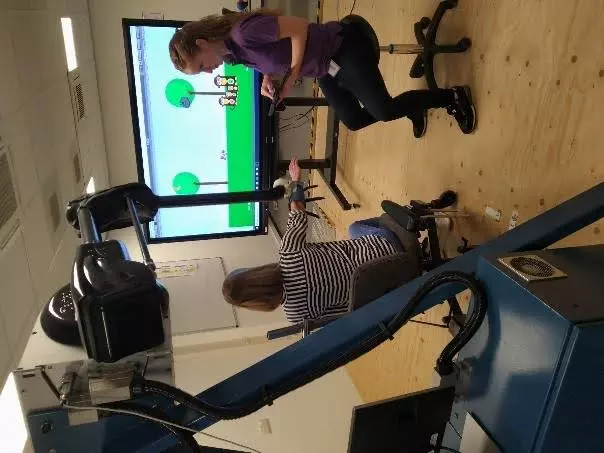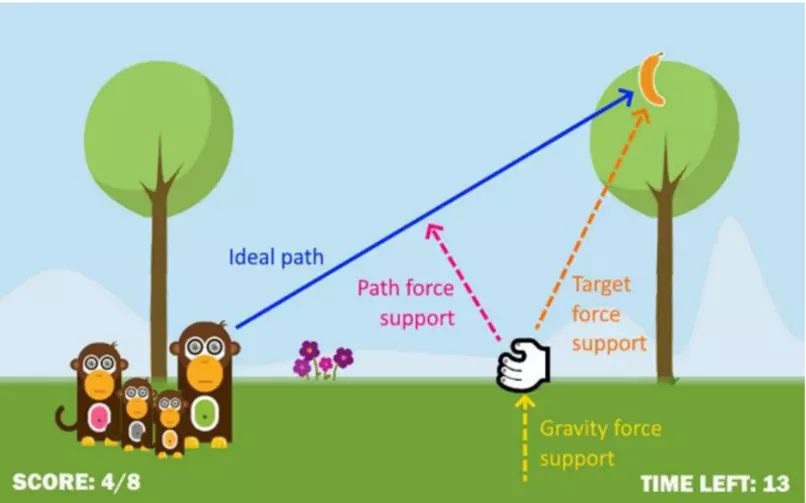Imagine regaining the ability to hug your loved ones or feed yourself after a debilitating stroke. That’s the life-changing potential that Veolia Nuclear Solutions (VNS) is helping to unlock by adapting its nuclear handling technology for stroke rehabilitation.
In 2019, VNS embarked on a groundbreaking journey, loaning our remote handling manipulator “Dexter” to the Adelante Rehabilitation Centre in the Netherlands. Dexter, a sophisticated robotic arm originally designed for handling radioactive materials, was chosen for its natural range of motion and ability to provide fine force feedback to its operator. The goal of the trial: explore whether this technology could improve rehabilitation outcomes for stroke patients.
Working alongside the University of Hasselt, we developed specialised mechanical and software interfaces for Dexter. These enhancements allow Dexter to offer haptic* feedback (the sense of touch) and assistance during rehabilitation exercises. Through this feedback, patients experience controlled guidance as they engage in therapeutic games, such as reaching for a virtual banana to feed a monkey. This technology aims to stimulate the rebuilding of crucial neural pathways, enhancing a patient’s ability to move and control their arm and hand. Importantly, therapists can adjust Dexter’s level of assistance to tailor exercises to each patient's needs.

So far, the results have been inspiring. Every patient involved in the research trials perceived added value from the technology and wanted to continue with the exercises, showcasing the transformative potential of this technology in stroke rehabilitation.
Why This Matters:
- In the UK alone around 100,000 people have strokes each year and there are 1.3 million stroke survivors, with many facing significant arm-hand movement challenges.
- Improving arm-hand skill performance (AHSP) is crucial for enhancing daily activities and overall quality of life for stroke survivors.

The game screen illustrating different forces that can be personalised for each patient
About The Trial - ReHabTOAT:
The initial trial termed ‘Remote Handling concept based, Task-Oriented Arm Training’ (ReHabTOAT) investigated how Dexter could enhance proprioception (the body's ability to sense movement, action, and location), and motor control. Dexter provides small assistive or resistive forces during exercises, for example, gently guiding a patient's arm forward or providing slight resistance as they try to extend their arm. This provides haptic feedback during movement, helping patients re-learn coordination and ultimately improve their overall AHSP.
- Participants: The trial enrolled five patients experiencing moderate to severe arm-hand impairments in the chronic phase post-stroke.
- Outcome: Participants demonstrated remarkable progress. Some regained the ability to dress themselves, hug loved ones, and independently use cutlery to feed themselves – milestones that significantly impact daily living.
Therapists at Adelante Rehabilitation Centre noted, "The integration of Dexter into our rehabilitation programs has opened up new possibilities for patient recovery. The ability to provide precise haptic feedback and adjust assistance levels dynamically has significantly enhanced our therapy sessions."
Next Steps:
Building on the initial success, a larger randomised controlled trial has recently been completed. We eagerly await the full analysis of these results, which will provide insights into Dexter's effectiveness across a larger and more diverse group of stroke patients. We are incredibly proud that adapting our nuclear handling technology has made such a profound impact on stroke rehabilitation and we look forward to contributing to the continued development of this innovative system.
Acknowledgments:
We are pleased to acknowledge the publication of three key reports related to the research projects referred to in this article:
Task-oriented arm training for stroke patients based on remote handling technology concepts: A feasibility study - Jule Elmanowski, Melanie Kleynen, Richard Geers, Gustavo Rovelo-Ruize, Eva Geurtse, Karin Coninx, Jeanine Verbunt, and Henk Seelen, 2023
Effects of a remote-handling concept-based task-oriented arm training (ReHab-TOAT) on arm-hand skill performance in chronic stroke: a study protocol for a two-armed randomized controlled trial - Jule Elmanowski, Henk Seelen, Richard Geers, Melanie Kleynen and Jeanine Verbunt, 2023
Task-oriented arm training for stroke patients based on remote handling technology concepts: Results of a pilot study - Jule Elmanowski, Henk Seelen, Richard Geers, Melanie Kleynen and Jeanine Verbunt, 2023
For more detailed information on these studies, please refer to the published reports.


